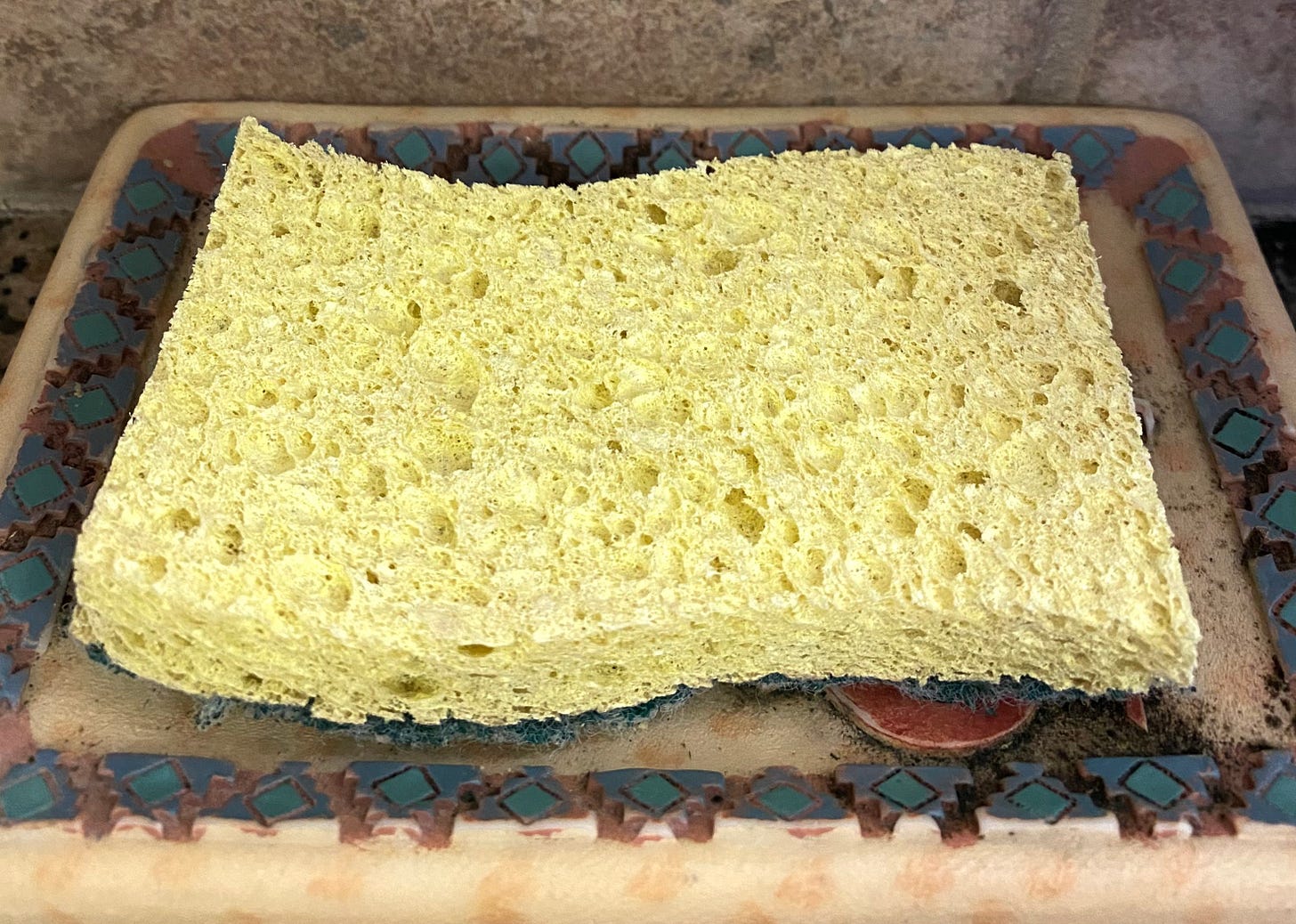Friday round-up
As you might have guessed by now, my inspiration for writing comes mostly from the mundanity of life—things I read or hear or notice while doing real life every day. Sometimes I chew on the little tidbits for a while, letting them roll around and become something bigger, and other times I need to get them out quickly so I can move on. Often they either come out or disappear altogether even though I keep a plethora of notes in my phone to remind me of their existence. Sometimes I look at a reminder I added months ago and roll my eyes and hit delete. It wasn’t as important as it seemed back then; a lot can change in thirty days . . . or thirty minutes.
Today is a get-it-all-out day in which I have a story, a stumble, and a sponge.
A story
I have been spending my weeks, Monday through Friday, in Northern Virginia with my mother while Daddy has been in rehab. I go home on the weekends to say hi to my husband (Hi, dear!), do some cooking for the upcoming week, both for him and for Mom and me, and reassure Hank that I’m still alive.
Ben told me when I left on Monday, Hank ran to the window whining and watched me drive away, then marched his little eight-pound self-full-of-attitude into the office and gave Ben a hateful look. Then he curled up on my side of the bed and wallowed in self-pity for the afternoon. If only he had some personality. Somehow they make do without me.
I heard from Ben again Tuesday, when he shared this:
He got up that morning and did the usual things: take the dog out, make the coffee. Then he put on his glasses and that’s when the fun began.
He realized instantly that he could not see with his glasses on. So he took them off, drank some coffee, and waited a bit. Put them back on and right away knew something was terribly wrong. He couldn’t see a thing. He figured they just needed some kind of adjustment and that our favorite optician Roger was just the guy to do it.
So he got in the car and drove 30 minutes to Farmville. Walked into Roger’s office, where he stopped at the front desk and explained to the gal there that he’d put his glasses on and couldn’t see straight and thought they might just need Roger’s magic touch.
The gal took his glasses and held them up. She looked at Ben and back at the glasses in her hands. Back at Ben.
“Um, Mr. Sargent, you’re missing a lens.”
Ben retrieved his glasses, thanked her very much, and drove home to find the missing lens in his bed.
I am not sure what the moral of this story is, other than how do you not know you’re missing a lens? I could probably turn this into a lesson on what married couples really do for one another—each helping the other see the issues of life more clearly and all. But I think it is just a practical situation that shows how much we need each other to find the lens when it falls out in bed.
A spelling stumble
We’ve covered this topic before, but just in case you missed it, and for those in the back who may not have been paying attention, let’s hit the basics one more time because I spotted this on the Internet and if I don’t get this out I might explode:
When I saw this on the website of my favorite supplement company, I closed my eyes and said right out loud, “Please make it stop.” I want you to know that they make supplements much better than they write, but that’s why they’re a supplement company and not a writing company. I love their supplements and have taken them for ten years. Their writing, not so much.
Possibly the two most-confused words of all time are home and hone and they are in no way interchangeable. Not at all ever.
Hone means to sharpen, as a blade or a skill. You hone your craft or your ax or your ability to exercise patience.
Home, used with in and usually also on, means to aim toward a target or goal. You home in on the results you want. Think of a homing pigeon, who homes in on the place you want him to go. He is not a honing pigeon. That would be impossible for one little bird. What would he sharpen? His beak? His talons? No. He homes. He goes home. He homes in on the target.
Hone is for a knife (two N sounds).
Home is for going home—a particular place or target or goal.
This advertisement should say “Home in on your goals . . .”
Thank you for coming to my grammar TED talk.
A sponge
The idea occurred to me yesterday that I am like a sponge, and I’m telling you this because maybe you are too, in which case we can commiserate—or celebrate the fact that we are different.
Today I feel like this sponge on my mother’s sink: old, stained, a little worn around the edges. Shriveled. I’ve seen better days.
At 62 I am just now learning deep things about myself. It took this long to become an observer of my own self, and what an interesting and enlightening journey it’s been.
I can look back over my life and see this truth: that I am and have always been an absorber. Even as a child I could sense the mood of a room as soon as I walked in and I could feel it taking over my body—not just my mind, but my actual, physical body.
I osmose the energies around me: anger, anxiety, sadness, joy. I can see tension like a thick cloud and feel it enter me and begin to tighten my chest, my throat, my head, and spread down through my extremities. Whatever emotions fill my vicinity, my body and my spirit internalize them and I become them. Asking me to not be so is like asking ice to not melt on a hot sidewalk.
If you’ve never experienced this, it may sound crazy and woo-woo and all that, but if you have, you are nodding your head in agreement and suddenly feeling understood. I see you. I hear you. I literally (in the actual, literal sense of the word) feel your pain. I feel it. There is a name for us; we are highly sensitive people, HSPs.
I’ve tried to deny this for a long time. In our culture, sensitive people are not valued. They are looked down on. They are advised to buck up, act fine even if they’re not. Sensitive people make us uncomfortable because we don’t know what to do with all that emotion.
I feel this absorption happening every day and I cannot turn it off. I don’t know how to not feel every energy in a room. If the tension is thick and someone happy and calm walks in, I want to run to that person and stand close for relief. Lacking that, the only thing I know to do is walk away, get out of the situation, and do something physical. Yesterday I scrubbed a bathroom. Going for a walk is also helpful, especially if it is surrounded by nature. Physical activity gives the excess energy somewhere to go.
Ben says when he is agitated, the best thing for him to do is stand out in the pasture with the cows, and while I am not as obsessed with our animals as he is, I agree. Their calm is palpable, and aside from the bull, the rest of the herd does bring me a feeling of peacefulness. We call it cow therapy. I should charge $120 an hour for it. Wanna come stand with my cows?
Part of me wishes I were not sensitive, but part of me also realizes this is how God made me, so who am I to wish otherwise? Accepting it is an ongoing process.
That’s my week in a nutshell. If you have a ridiculous story, I’d love to hear it. If you’ve seen a grammar snafu, send me a photo. I love them! And if you are a HSP like me, let’s learn to embrace the way God made us.





